What is Climate Change?
Understanding Climate Change
Climate change refers to the Earth’s climate’s long-term variations, with history showing periods of warmth, like the Jurassic period, and cold spells, like the Ice Age.
However, in the last 140 years—since the Industrial Revolution—Earth has witnessed a significant rise in temperatures, primarily driven by human activities. The predominant factors include the burning of fossil fuels and practices like deforestation and intensive farming.
The Role of Fossil Fuels
Fossil fuels — comprising coal, oil (petroleum), and natural gas — derive their name from their origin: they are formed deep within the Earth from the remains of ancient plants and animals. These fuels are integral to modern life: coal and natural gas are predominantly used for electricity generation in power plants, while petroleum is mainly used to produce gasoline.
Explaining the Greenhouse Effect
Burning fossil fuels releases carbon, which then combines with oxygen to form carbon dioxide (CO2) — a process that is central to the greenhouse effect. This phenomenon sees CO2 and other gases (like methane and water vapor) acting similarly to the roof of a greenhouse: while they allow sunlight to enter, they prevent heat from escaping, leading to a warming effect on Earth’s atmosphere.
Implications of a 1°C Temperature Rise
While activities like charging phones, baking, or driving may seem insignificant, they collectively contribute to our carbon footprint due to our reliance on fossil fuels, leading to a substantial rise in Earth’s temperatures. A rise by about 1°C (or 1.8°F) might seem small, but it has far-reaching impacts on the planet.
Much like a slight fever in the human body can signal more significant health issues, even a seemingly small increase in Earth’s temperature can lead to a cascade of extreme weather events, including but not limited to:
- Intense hurricanes
- Heavy snowstorms
- Severe heatwaves
- Prolonged periods of intense rainfall
- Gale-force winds
- Extended droughts
- Flooding
- Landslides
- Unpredictable and severe winter conditions
Each of these events can, in turn, have devastating effects on the environment, human societies, and the global economy, underlining the urgent need to address and mitigate the impacts of climate change.
At NetZero.Earth, we’re driven by a bold vision: promoting environmental sustainability and helping GCC businesses understand and reduce their carbon emissions.
Our expert team is ready to collaborate closely with you, developing strategies that align with your sustainability goals. And if you don’t have clear goals, we’ll help you create them.
Get in touch.
contact@netzero.earth.




Leave a Reply